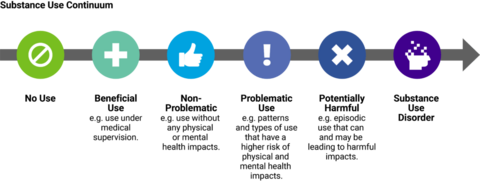It’s March and the sounds of Spring are in the air! By sounds of Spring, we mean the excessive honking of geese as they return from their winter vacays. Watch your step.
As we head into the weekend and one of the most celebrated holidays around the world, St Patrick’s Day, it is a great time to talk about substance use health.
Whether it’s green beer, regular beer, tobacco, caffeine, cannabis, or illicit drugs, substances are a fact of life. In Canada, it is estimated that 78% of people over the age of 15 regularly use substances of some kind, so it’s important that we develop healthy relationships with them.
The Changing Context of Substance Use
Historically society's relationship with substances has been adversarial and punitive, often leading to immense shame and stigma around substance use. Of course, many lives have been negatively impacted by substance use disorders. Effective legislation around safe access, as well as effective treatment options, are crucial to positive health outcomes. However, the stigma and shame that often accompanies substance use can create barriers to treatment.
The Community Addictions Peer Support Association (CASPA), an organization working to eliminate substance use stigma notes that many people who are concerned about their substance use do not seek treatment. Both CASPA and Health Canada are working to create a supportive framework for substance use that eliminates the stigma around substance use and focuses on positive health outcomes.
Understanding the Substance Use Spectrum
Substance use is different for everyone. Different substances have different effects on a person depending on factors like the substance(s) being used, tolerance, sex, age, weight, and any underlying health conditions, among other factors. According to Health Canada, “People use substances, such as controlled and illegal drugs, cannabis, tobacco/nicotine and alcohol for different reasons, including medical purposes; religious or ceremonial purposes; personal enjoyment; or to cope with stress, trauma or pain. Substance use is different for everyone and can be viewed on a spectrum with varying stages of benefits and harms” (Health Canada, 2022).
- Non-use: Is often referred to as abstinence. Non-users do not use a specific substance, or possible any substances.
- Beneficial use: Has positive health, social, or spiritual uses, such as taking medications as directed or religious use of tobacco (such as smudging).
- Lower-risk use: Use that has minimum impact to a person, their family, friends, work, or others. For example, someone who follows the low-risk guidelines for alcohol or cannabis.
- Higher-risk use: Use that has a harmful and/or negative impact on the person, their family, friends, work, or others. For example, the use of illegal drugs, impaired driving, binge drinking, combining multiple substances, increasing frequency, and/or increasing quantity.
- Substance use disorder: Previously referred to as addiction, substance use disorder is a treatable medical condition that affects the brain and involves compulsive and continuous use despite negative impacts to a person, their family, friends, work, and others. Someone with a substance use disorder cannot stop using alcohol, drugs, tobacco, etc. even if they want to.


Everything you Think you Know About Additiction is Wrong - Johann Hari
Understanding Your Own Substance Use
It's important to stay vigilant about substance use. Regularly reflecting on how and why you’re using substances can be helpful. It is easier than you might think to slide from beneficial or occasional use to higher-risk use and even substance use disorder.
- Make a list of the substances you use (caffeine, alcohol, tobacco, drugs—legal or illegal, etc.)
- Start with the first substance. Where do you think your current usage falls on the Substance Use Spectrum? (Before you rate your substance use, read the guidelines for safe usage. Most people perceive their substance use as lower than it actually is).
- How does your current level of use impact your goals/health outcomes? (For example, does your current use enhance your health and well-being, or reduce your health and well-being by causing anxiety, negatively impacting sleep, reducing motivation, damaging relationships, etc.?)
- Are you comfortable with your current level of use? Do you like the impact it has on your life, health, and overall well-being? If so, carry on.
- If not, ask yourself what relationship you would like to have with that substance?
- Take steps to change your relationship with the substance. Explore cutting back (harm reduction), finding other ways to manage stress (coping skills), change how and when you partake (habit formation), or access support/intervention programs for substance use disorder (treatment).
- Then repeat the steps for the other substances on your list.
A healthy relationship with another person is a shared exchange between two people with no one having more power or control than the other. Healthy relationships have boundaries, we feel safe within them, and most important, our partners actively support our dreams and goals.
Whether it is your relationship with energy drinks, edibles, academic performance enhancers (yes, we know about them—please be careful—they are really dangerous), illegal drugs (also dangerous) or this weekend’s green beer (less dangerous but it turns your urine green which can be unsettling), ask yourself how well this relationship supports you? Do you feel safe with your current level of use? Does your current level of substance use help you make your goals and dreams a reality? After all, you deserve a great life and healthy relationships!
If you are concerned about your current level of substance use, or are concerned about someone else, please visit the Campus Wellness website on substance use and harm reduction, and or booking an appointment with a counsellor (Counselling Services, Empower Me, or privately using your Student Health Benefit).
Do you Have an Idea or Article You Would to Contribute?
If so, we would love to hear from you! Please contact the Community Wellness Team.